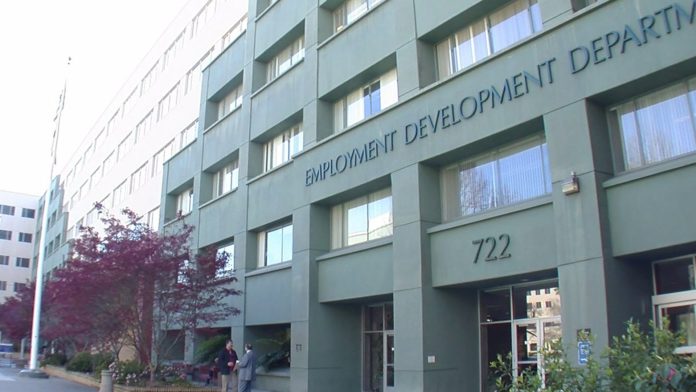
EDD. (Photo: EDD.ca.gov)
Extended Duration Benefits under the Unemployment Insurance Code
Deals with computation of the amount and duration
By Chris Micheli, October 19, 2024 2:30 am
In the California Unemployment Insurance Code, Division 1, Part 3, Chapter 2, Article, it deals with eligibility and disqualifications for extended duration unemployment benefits. Section 3551 specifies that extended duration benefits are payable from the Unemployment Fund to unemployed individuals who are eligible under this part.
Section 3552 states that an unemployed individual is eligible to receive extended duration benefits with respect to any week only if the director finds that an extended duration award has been established for the individual and the week in within a specified period.
Section 3553 states that the filing of a valid primary claim by an exhaustee constitutes an election by him to claim extended duration benefits to the exclusion of filing a new claim for normal benefits for any week of unemployment subsequent to the filing of such primary claim for which extended duration benefits are payable to him.
Article 2 deals with computation of the amount and duration. Section 3601 provides that the exhaustee’s weekly benefit amount under an extended duration award is the same as his weekly benefit amount for the parent benefit year.
Section 3602 specifies that an exhaustee’s extended duration award during any one extended duration period is 13 times his weekly benefit amount or one-half of the maximum amount of normal benefits payable to him during his parent benefit year, whichever is the lesser. Section 3603 says that only one extended duration award may be established for an exhaustee based on any one parent benefit year.
Article 3 deals with filing, determination, and payment of extended duration benefit claims. Section 3651 provides that claims for extended duration benefits are to be made as provided in this article.
Section 3652 states that an exhaustee who desires to claim extended duration benefits is required to file a valid primary claim. A primary claim for extended duration benefits is valid only if its effective date is within an extended benefit period and the individual filing it is an unemployed exhaustee. The term “valid primary claim” is defined.
Section 3653 provides the effective date of a valid primary claim is to be determined in the same manner as the effective date of a new claim for normal benefits.
Section 3654 requires the department to give a notice of the filing of a primary claim or an additional claim to the employing unit by which the exhaustee was last employed immediately preceding the filing of the claim unless the additional claim is the result of the filing of a partial claim as defined by the department, there has not been a subsequent employing unit which is designated as the last employer, and there is no separation issue.
Section 3654.1 states that whether an unemployed individual meets the eligibility requirements, the director may pursuant to his authorized regulations require that wage and employment information to be submitted to the director, within 10 days after the mailing of a request by the director.
Section 3654.2 provides that any employing unit who fails to furnish wage information requested by the director is subject to a penalty of $10 for each such report not submitted. Penalties collected under this section are deposited in the Unemployment Fund.
Section 3654.3 specifies that, if any employing unit fails to respond to a request for wage information within the period prescribed, then the director is required to make a determination based upon available information.
Section 3654.4 requires the department to consider the facts submitted by an employing unit and make a determination as to the exhaustee’s eligibility for extended duration benefits. The department must promptly notify the exhaustee and any employing unit who prior to the determination has submitted any facts of the determination and the reasons therefor.
Section 3655 requires the EDD to consider the facts submitted by an employer and, if benefits are claimed subsequent to the filing of the extended duration benefits claim, make a determination as to the exhaustee’s eligibility for the extended duration benefits. The EDD must promptly notify the exhaustee and any employer of the determination and the reasons therefor.
Section 3656 specifies that, upon the filing of a valid primary claim by an exhaustee, the department must promptly make an extended duration award computation that sets forth the maximum amount of extended duration benefits potentially payable during the extended duration period, the weekly benefit amount, and the expiration date of the extended duration period.
Article 4 deals with reserve accounts. Section 3701 provides that an employer that is entitled to notice of the filing of a primary claim or additional claim and that, within 10 days after mailing of the notice, submits to the department any facts within its possession disclosing whether the exhaustee left the most recent employment with the employer voluntarily and without good cause or was discharged from the employment for misconduct connected with their work, is to be entitled to a ruling as prescribed by this section. The period during which the employer may submit these facts may be extended by the director for good cause.
If the claimant voluntarily leaves the employer’s employ without notification to the employer of the reasons therefor, and if the employer submits all of the facts within its possession concerning the leaving within the applicable time period referred to in this section, the leaving is presumed to be without good cause.
Section 3702 provides that extended duration benefits, to the extent that such extended duration benefits are not reimbursed or reimbursable by the federal government to the State of California, are to be charged against the reserve account of the exhaustee’s employer during his or her base period.
- This Is an Interesting Limit on Rulemaking Power - February 23, 2026
- Miscellaneous Civil Action Proceedings - February 23, 2026
- Probate Code Could Be a Basis for Statutory Interpretation Principles - February 22, 2026



